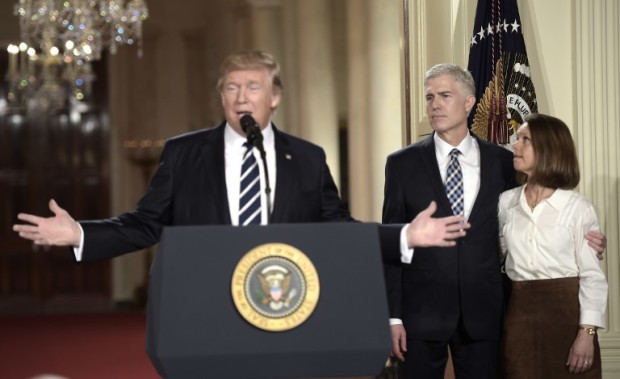
Judge Neil Gorsuch (center) and his wife Marie Louise look on after US President Donald Trump nominated him for the Supreme Court on Jan. 31, 2017. Trump’s nomination of federal appellate judge Gorsuch will tilt the balance of the court back in the conservatives’ favor. AFP
WASHINGTON, United State — Donald Trump nominated Neil Gorsuch to the Supreme Court Tuesday, seizing an unusual early opportunity to put conservatives back in the majority on America’s top court.
In a primetime address that was part jurisprudence, part reality show, Trump tapped the 49-year-old appeals court judge from Denver, Colorado.
If Senate confirmed, he will fill the seat made vacant by the death of Antonin Scalia nearly a year ago and tilt the balance of the court five-to-four in conservatives’ favor.
The elegant, silver-haired jurist with a flair for writing incisive rulings is the youngest nominee in a generation.
His appointment could have a major impact on cases ranging from business regulation to gender rights to gun control.
After unprecedented hyping of the announcement, Trump invited Gorsuch and his wife to emerge dramatically before an audience in the East Room of the White House.
“Here they come. Here they come. So was that a surprise? Was it?” said Trump, ever the showman.
“He could have had any job at any law firm for any amount of money, but what he wanted to do with his career was to be a judge, to write decisions, and to make an impact by upholding our laws and our Constitution,” Trump said.
But despite the razzmatazz, Gorsuch was also a remarkably orthodox pick for a president who has scythed through norms and precedent during his brief time in office.
Like Scalia, Gorsuch is considered an “originalist” — guided in his legal thinking by the constitution’s original intent and meaning.
Gorsuch says he was on the ski slopes when he learned of his mentor’s death last February: “I couldn’t see the rest of the way down the mountain for the tears,” he remarked in a speech soon after.
For Trump, the selection is payback to evangelical Christian and conservative Republicans who backed his bid for the presidency — at times reluctantly.
“Millions of voters said this was the single most important issue to them when they voted for me for president,” Trump said.
“I am a man of my word. I will do as I say — something that the American people have been asking for from Washington for a very, very long time.”
Job for life
The Supreme Court is the final arbiter of many of the most sensitive issues of American life and law.
Its members are named to life terms so their influence is long-lasting.
Given the advanced age of several sitting justices, Trump could potentially make several appointments during his term, shaping the court’s direction for a generation.
Once confirmed, however, justices enjoy independence and some have proved politically unpredictable.
With an eye to a bitter Congressional fight, Gorsuch presented himself as someone who is fair-minded and self-deprecating.
“A judge who likes every outcome he reaches is very likely a bad judge, stretching for results he prefers rather than those the law demands,” he joked.
‘Very serious doubts’
Much of Democrats’ opposition to Gorsuch is likely to stem from Republicans’ behavior after Scalia’s death.
For the better part of a year, Congressional Republicans refused to give then president Barack Obama’s pick a confirmation hearing.
Democrats, who are in a minority in both chambers of Congress, are still smarting from Republican treatment of Obama’s pick, Merrick Garland.
Garland has since returned to his old job as chief judge of the US Court of Appeals for the District of Columbia Circuit in Washington, but Democrats could yet pick a fight.
And although Republicans hold 52 seats in the Senate, they need 60 to confirm a nominee.
That means Gorsuch must be someone capable of winning some Democratic votes — a task made tougher by the row over Trump’s ban on travelers from several Muslim countries.
“A little more than a week into the Trump presidency, the new administration has violated our core values, challenged the separation of powers, and tested the very fabric of our Constitution in unprecedented fashion,” said Senate minority leader Chuck Schumer.
Schumer said it was up to Gorsuch to “prove himself to be within the legal mainstream” and “vigorously defend the Constitution from abuses of the Executive branch.”
But he added: “Given his record, I have very serious doubts about Judge Gorsuch’s ability to meet this standard.”
Nancy Pelosi, the House Democratic minority leader, called Gorsuch “hostile to women’s rights” and said the consequences of confirming him “could not be more serious or far-reaching.”
“Judge Gorsuch’s record reveals he holds radical views far outside the mainstream of American legal thought,” she said.
Republicans welcomed the decision.
“He has an impressive background and a long record of faithfully applying the law and the Constitution,” said Senate majority leader Mitch McConnell.
“When the Senate previously confirmed him to the appellate court, the bipartisan support in the Senate was so overwhelming, a roll call vote was not even required,” he added. CBB